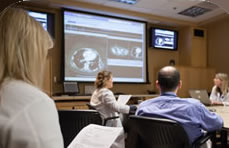Power in Numbers
A U-M cancer doctor explains a tumor board and how multiple experts help patients
Cancer patients tend to rely on their physicians for answers and treatment plans, but may not know how much is going on behind the scenes to help their cases. The U-M Rogel Cancer Center holds regularly scheduled meetings -- called tumor boards -- to bring experts together to discuss difficult cases and recommend the best course of treatment moving forward.
We sat down with Jorge Marrero, M.D., former-director of the U-M Rogel Cancer Center's Multidisciplinary Liver Tumor Clinic, for an introduction to tumor boards, why collaboration matters and how multiple experts in one room can help cancer patients obtain the best outcomes.
How would you define a tumor board to a patient or family member who isn't familiar with the term?
A tumor board is a multidisciplinary meeting where complex patient cases are discussed in significant detail. We concentrate on patients with difficult tumors or patients who have previously received treatment and, for various reasons, now need a different treatment plan.
All the disciplines are involved in this meeting. There may be a dozen experts or more in one room. Each patient's diagnosis is introduced, and the group reviews the patient's scans with the goal of coming up with the best treatment plan.
You mentioned that all the disciplines are involved. What exactly does that mean?

It means that every type of specialist with expertise in the specific cancer takes part in the meeting. For example, in liver cancer there will be two types of surgeons in the room: transplant surgeons and surgical oncologists. There will be a diagnostic radiologist and interventional radiologist. Others represented are hepatologists (liver specialists), medical oncologists and radiation oncologists.
Why is it important for our patients to have so many people reviewing their cases?
Tumor boards are great for patients because members of each specialty bring their own expertise to the table. They each have a unique view of the best approach to treat and care for a patient. It is great to have different perspectives according to the different specialties. We all complement each other, share knowledge and offer recommendations as far as the best strategy for the patient.
How can all these doctors and clinicians assess a case when they might not have met the patient they're discussing?
Typically, the patient's primary cancer physician will present the case at the liver tumor board after having seen the patient. What we try to do in the tumor board meetings is develop a strategy based on what we're seeing -- right now -- on a patient's scans. The tumor board isn't a substitute for quality patient care and thorough assessments by caregivers. For the most part, the benefit of the tumor board is that the patient has different experts commenting on his or her case, in addition to regular appointments with his or her doctor.
After the meeting, the patient receives a recommendation on how his or her treatment should progress.
Do other hospitals and health systems have tumor boards? What sets a tumor board apart?
Tumor boards are very standard at medical centers. The big difference at the University of Michigan Rogel Cancer Center is the depth of discussion and level of expertise.
For example, we're extremely unique in having a liver tumor board. Other hospitals might have an abdominal tumor board where they discuss all tumors of the abdomen, including the liver. Here, we separate them because of the expertise in liver and other gastrointestinal tumors.

Having tumor boards is also a way for U-M experts to be better educated because, for example, a non-surgeon might learn about the latest surgical approach or we might identify that a patient is a good fit for a research study. We learn from one another how to best treat the patient.
This is in contrast to community hospitals where all cancer cases are typically discussed at one single tumor board.
What types of things might be discussed at a tumor board meeting?
We discuss the best treatment approach, especially pertaining to complex cases. One example is a patient who had a very large tumor that was surrounding a major vein in the liver. The patient was referred to our Rogel Cancer Center after not being able to have surgery at another institution, and the case was discussed at our liver tumor board.
The U-M transplant surgeon performed an auto-transplantation: taking the liver out, removing the tumor on the table and putting the liver back in without the cancer. That's an example of a case where you need the expertise of the members of the liver tumor board to provide exceptional care.
What clinics at the University of Michigan have tumor boards?
We have such a wealth of expertise that we basically have a separate tumor board for every tumor.
